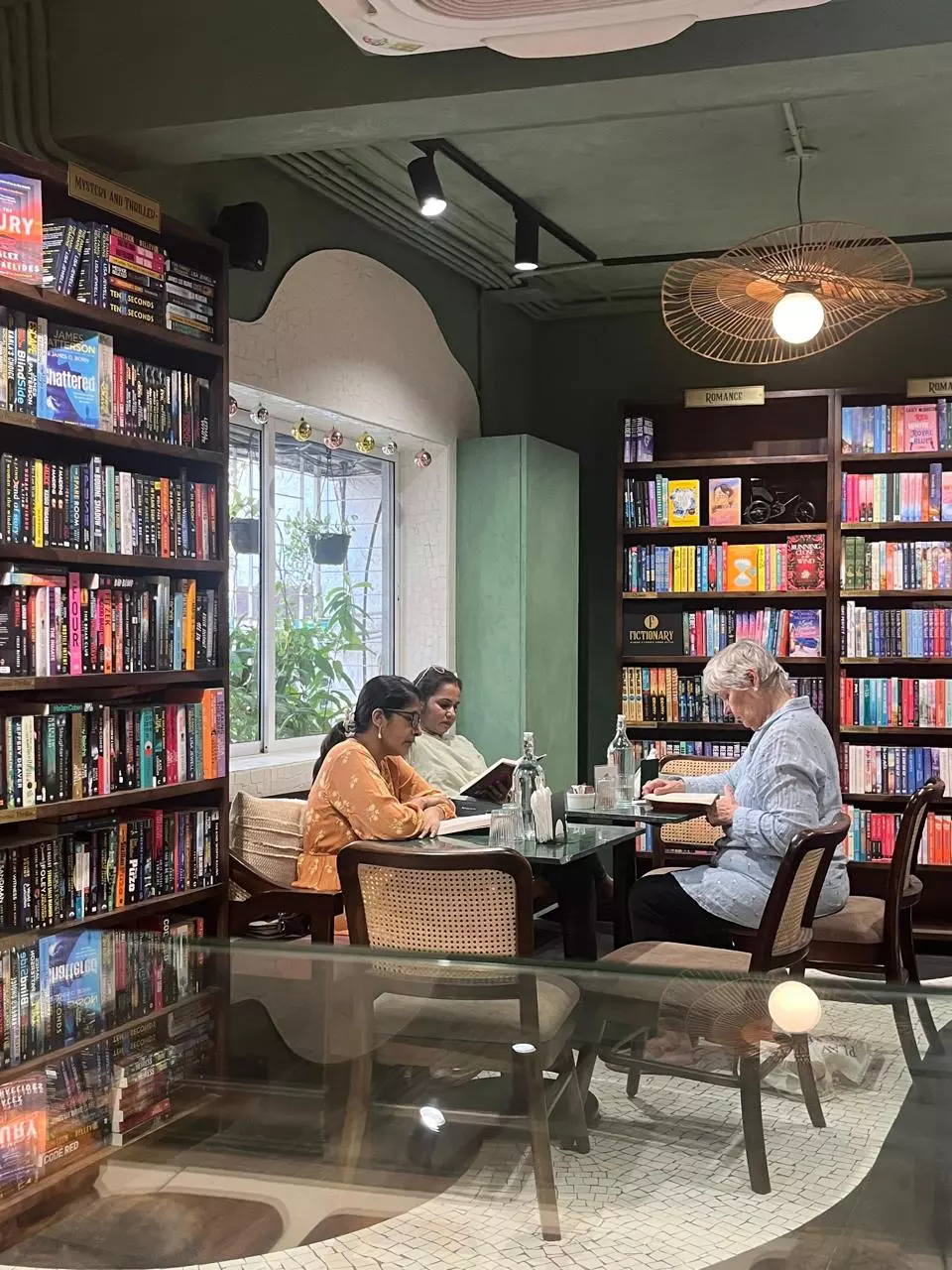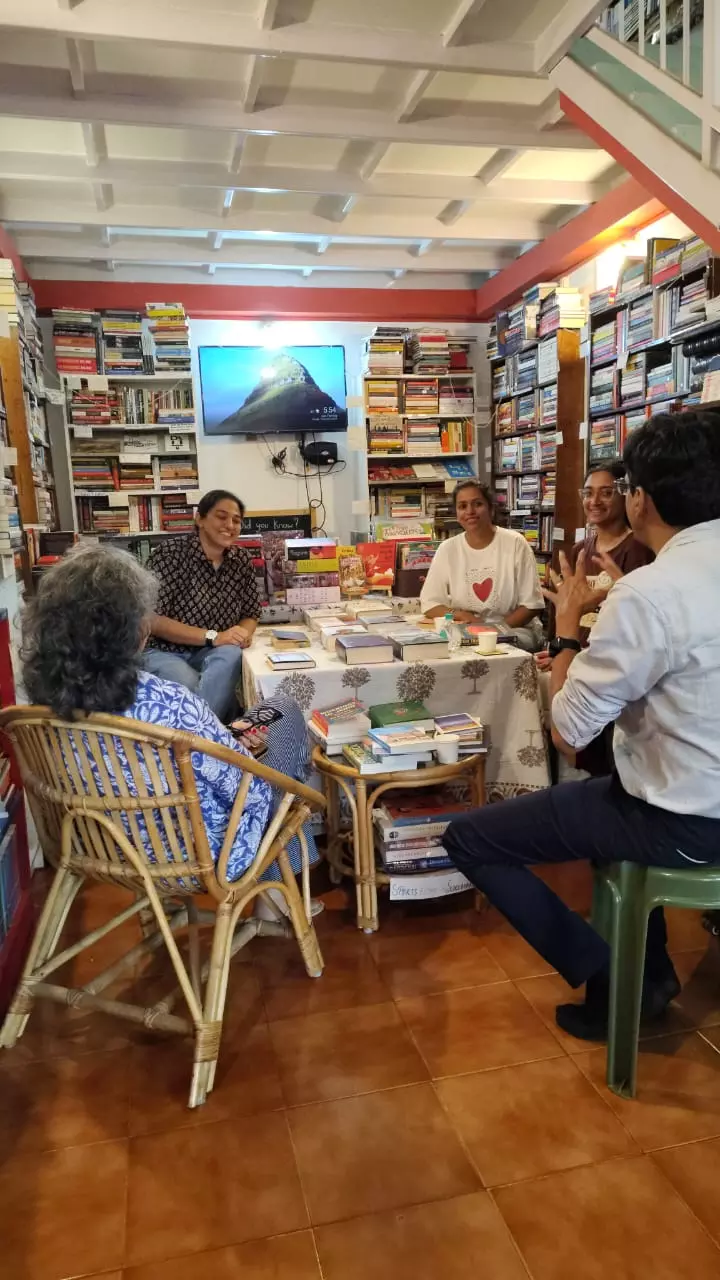
- Home
- India
- World
- Premium
- THE FEDERAL SPECIAL
- Analysis
- States
- Perspective
- Videos
- Sports
- Education
- Entertainment
- Elections
- Features
- Health
- Business
- Series
- In memoriam: Sheikh Mujibur Rahman
- Bishnoi's Men
- NEET TANGLE
- Economy Series
- Earth Day
- Kashmir’s Frozen Turbulence
- India@75
- The legend of Ramjanmabhoomi
- Liberalisation@30
- How to tame a dragon
- Celebrating biodiversity
- Farm Matters
- 50 days of solitude
- Bringing Migrants Home
- Budget 2020
- Jharkhand Votes
- The Federal Investigates
- The Federal Impact
- Vanishing Sand
- Gandhi @ 150
- Andhra Today
- Field report
- Operation Gulmarg
- Pandemic @1 Mn in India
- The Federal Year-End
- The Zero Year
- Science
- Brand studio
- Newsletter
- Elections 2024
- Events
International Literacy Day: How bookstores are helping build communities of readers
Independent bookstores across India are experimenting to remain relevant, hosting events like open mics, book tastings and lit clubs, to foster a shared love of books

In the 1990s, circulating libraries were a young reader’s gateway to the world of books. Mine was a two-room space that had floor-to-ceiling bookshelves. Stepping inside, the noise of the world would fade, replaced by a reverential hush. When the first Crossword opened in Mumbai in October 1992, readers were introduced to the chain-bookstore format. It was a completely...
In the 1990s, circulating libraries were a young reader’s gateway to the world of books. Mine was a two-room space that had floor-to-ceiling bookshelves. Stepping inside, the noise of the world would fade, replaced by a reverential hush.
When the first Crossword opened in Mumbai in October 1992, readers were introduced to the chain-bookstore format. It was a completely different experience; the shops all shiny and colourful, with a distinct new-book smell! Meanwhile, the roadside book stores continued to offer their own treasure hunt, where booklovers could unearth literary gems for a bargain.
Today, the circulating libraries have largely disappeared and the number of roadside bookstores appears to be dwindling. Does that mean the demand for books is on the wane? Not really. Most of those this writer spoke to concurred that even with the advent of e-reading, the charm of physical books endures. Not only because people now like to collect books, but also because of the ever-expanding range of titles being published. There has also been the advent of niche bookstores. Mumbai, for example, has Kahani Tree for children’s literature and Leaping Windows for graphic novels.
As screens dominate and e-commerce promises instant delivery, independent bookstores across India are quietly experimenting to remain relevant. Beyond the now-common book launches and author signings, book stores today host a range of inventive events, including ‘murder mystery nights’ and 'children’s story hours’. Some host ‘open mic’ evenings, where participants can perform or share works they have authored.
Also read: As house sparrows vanish, how people across cities fight to bring them back
There are also more creative events — like a 'Book Tasting' hosted in Bengaluru in August, a collaboration between Champaca Bookstore and Broth Noodle Bar. Guests enjoyed two courses of ramen and a Japanese-inspired dessert. Each person had a different Japanese book in front of them, ranging from non-fiction to graphic novels, poetry and travelogues. Everyone spent five minutes reading the book in front of them and then, once the timer rang, passed the book on to the person on their right. In 15 minutes, participants got to sample three different books, translated from Japanese. There were only 20 seats and the event sold out within three hours.
The Dogears Bookshop in Goa had a unique bookmark exchange event for artists on 30 August; it is scheduled to become a regular part of their events calendar. Pagdandi Bookstore & Coffee have collaborated with Barroom in Pune to organise a 'Lit Club', where participants dress to match a featured book, debate and are quizzed on it as they sip themed cocktails. The recurring event started early this year. An upcoming event in Mumbai will see Fictionary Bookstore collaborating with the 3 Art House cultural centre for a hyperlocal neighbourhood festival in the city’s Bandra and Khar areas that will blend books with panel discussions, workshops, art installations, film screenings and performances for 500 participants.
Events like these have helped bookstores evolve into experience centres. Why are so many bookstores becoming destination-driven spaces for leisure, culture and social connection? Has the act of buying books changed to one of creating ‘bookish’ communities? Has a solitary act now evolved into bonding over the love of reading?
For Anup Nair, founder of the almost year-old Fictionary, Mumbai’s position as a cultural and artistic hub offers fertile ground for building a bookstore around the community. “There are many young adults who are looking for connections, often transplants into Mumbai who have lost their core friend group. Events like these allow for friendships to flourish, and over time these people become regulars. Since the Covid pandemic, there has been a rise in book clubs, silent reading chapters, and book communities in Mumbai and metro cities, making reading cool again,” he explained.

Readers at Mumbai's Fictionary Bookstore. Photo courtesy the store.
Book clubs are bringing together people to discuss and connect over literature, through reading challenges and features like ‘books of the month’. On Instagram, Bookstagram offers booklovers, authors and writers a space to share visually appealing content on books and reading. This includes reviews and recommendations, photos of aesthetic bookshelves or book hauls.
Leonard Fernandes, co-founder of The Dogears Bookshop in Margao, Goa, gives an interesting insight. “There is a concept of a third space, after work and home, a place where people unwind without the pressure to buy or perform. Cafés may also offer you some of that; however, there is an expectation to at least buy a coffee,” he said.
Fernandes added: “Parks are dwindling and screens dominate so much of our time that people are craving real, physical spaces to disconnect. Bookstores are tapping into this to get people through the door and offering not just books but places to sit, browse and take part in events. Also, books may not be considered as expensive as other hobbies and there’s an easy sense of camaraderie that people are drawn to.”

A book club meet at The Dogears Bookshop in Goa. Photo courtesy the store
There’s value for bookstores in these community activities — they increase brand awareness and in the long term, participants become buyers and loyal customers.
Also read: How online gambling ruined lives of young men in Maharashtra’s Solapur and Beed
For book lover and bookstagrammer Shubhi Agarwal, community events “give people a wonderful reason to visit bookstores more frequently and turn the place into a book haven”. She added: “For me, such events offer a rare chance to build a genuine connection with the team of the bookstore, which is a rare opportunity in the age of the internet. Having a favourite bookstore that you can escape to when life gets heavy is truly precious. It feels like coming home and that’s a beautiful experience.”
However, Akshaya Bahibala, co-founder of Walking BookFairs, Bhubaneshwar and Cuttack, offers a more critical view. According to him, activities like the above cater to the urban class of Indians. For him, the more urgent question is not whether such events influence reading habits, but who is actually reading? In smaller towns and cities, he pointed out, bookstores are scarce and distribution costs remain prohibitively high, leaving vast populations underserved. Young people, he lamented, are more focused on branding and creating reels than on building sustainable bookstores and libraries, even though that is precisely what’s needed if reading is to truly flourish.
When we look at a market like Bengaluru though, there exists a vibrant reading culture, with new bookstores opening up. Blossom Book House and The Bookworm were among the pioneers, with their second-hand and library business models, making books more accessible.
Radhika Timbadia, founder of Bengaluru’s Champaca Bookstore, said, “People are tired of online and find bookstores, a physical space, soothing. Hence, it becomes a community activity even if the act of reading is solitary. At Champaca, people come for recommendations and discovery [of new books]; we encourage people to come in, browse, read and choose books. This is what physical bookstores can provide that online ones cannot. Our goal is to introduce readers to a wide variety of books and to make reading enjoyable, which is why we host these activities, with different themes.”
Also read: How Raghunath Sasmal made Dahibara Aludum a part of Odisha’s culinary legacy
In the end, what these bookstores remind us is that fostering a reading culture isn’t just about selling books — it’s about creating opportunities to discover them. And more and more independent bookstores are finding value in this. So, while many have expanded their relevance, not limiting themselves to just selling books, they have also moved beyond sales-driven competition to become welcoming of more such spaces, recognising that greater access benefits everyone. Because when books are easy to find, communities grow around them, and the enduring magic of books finds a new beginning.
